Features
The Sandahiru event – celebrating failure
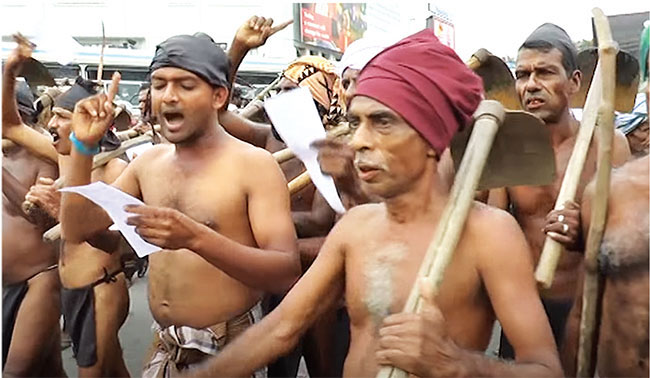
by Anura Gunasekera
A few days ago President Gotabaya Rajapaksa(GR), the first military man and, unarguably, the most ignorant in the ways of governance to occupy the presidential seat, celebrated the completion of two years as the eighth president of the Republic of Sri Lanka. The salutation coincided with the formal vesting with the Sangha, of the “Sandahiru Seya” in Anuradhapura, a project commenced during brother Mahinda’s last term as president. A towering stupa rising above the Jetawana and the Abhayagiri, ostensibly to honour the services rendered by the armed forces and the police in our ethnic conflict but, in reality, a monument to the Rajapaksa delusions of grandeur, aligns the Rajapaksa Family dynasty with the Sinhala Kings. A tribute to the heroic is justified but the supreme incongruity of conflating the quintessential Buddhist symbol, with success in a bloody military campaign, is inconsequential to a hegemonic mindset. The incompatibility was also ignored by the Rajapaksa-adoring Sangha, including the Anunayake Theros of both Asgiriya and Malwatte Chapters, who participated and enthusiastically endorsed its purpose.
Notwithstanding a grandiose commemoration, as Rajapaksa’s second year in the presidency ends and the year 2021 draws to a close, the country stands mired in calamities on every public front.
The Crisis
The economy is in disaster mode. Foreign reserves which were at USD 7.5 Billion in November 2019, when GR took office, had declined to USD 2.8 Billion by August 2021. Despite Central Bank Governor Cabraal’s blithe assurance that the economy can be restructured without IMF assistance, and that wildly reckless money-printing has no impact on inflation, banks are unable to provide importers with forex to import essentials, whilst prices of basic commodities are placing them beyond the reach of ordinary consumers. According to most economists, in the real world, when money printing increases in a background of stagnant or declining national output, all other factors being equal, hyper-inflation is the certain outcome. Recent historical examples are too numerous to quote here. However, Cabraal, who is one of the architects and, also, a highly privileged inhabitant of the Rajapaksa Dystopia, is obviously reading from a different text!
For the last few months, in every village, town and city across the island, for the first time since the Sirimavo Bandaranaike regime 50 years ago, desperate citizens have been waiting in queues to buy the most basic items. There are frequent shortages of sugar, rice, milk powder and cooking fuel; very recently, suppliers ran short of kerosene oil, the only convenient and affordable alternative to cooking gas. Gathering firewood is not an option, especially for the four million urban population of Sri Lanka.
The government has responded to the foreign exchange shortage by imposing drastic regulations to limit dollar usage, declaring over 600 imported items, including mobile phones, clothing, household appliances and a range of foods, as non-essential. Vehicles imports are also included in the restrictions.
Prices of essential foods, vegetables and staples have seen an astronomic escalation during 2021, due to low supply, either because of import restrictions or, in the case of locally grown items, a result of poor harvests due to denial- through unavailability- of basic nutrient inputs, and disruptions in the supply chain from distant growing areas.
The Cause
The pandemic has contributed to the crisis, dismantling livelihoods with some of the monthly paid subjected to wage cuts or layoffs, whilst daily paid workers are denied earnings through inability to access places of work or, because the lockdown has compelled the closure of many small establishments, which rely mainly on casual labour. As in many countries in the developing world, in Sri Lanka, the informal, small and medium scale entrepreneurial sector collectively supports more livelihoods, than either the State or the corporate sector. However, the Covid pandemic is only a contributory factor to an escalating socio-economic disaster. The government, through the implementation of a series of imprudent and ill-conceived policies, has aggravated the situation to a degree beyond retrieval.
Immediately after assuming the presidency, GR ordered sweeping tax concessions, which resulted in the diminution of government revenues by about 30% in 2020. These concessions were beneficial to a minute proportion of the population, which actually needed no such relief. They did not cascade to the ordinary citizen. Soon thereafter, to bridge the cash supply deficit the money printing spree commenced, according to some sources injecting as much as an additional 35% – 40% in to the economy, by mid-2021.
The pandemic Task Force was led by a retired army commander, appointed by a president unable to distinguish between the scientific complexities of fighting a virus, and the tactical requirements of assaulting an enemy garrison. This mindset was also compounded by an inherent insensitivity to the suffering of ordinary people. The mismanagement of the project in its early, critical stages led to an escalation of infections and deaths, especially amongst the elderly who were denied vaccinations at the outset. Successive waves of infection even led to embarrassing State sponsorship of miracle cures- the ridiculous “Dhammika Elixir” and the casting of holy water pots in to flowing water!!
Whilst people were desperately scrabbling around to sustain themselves in a setting of loss of income, essential item scarcities and other privations, overnight, the president decreed a ban on the use of inorganic fertilizer and agro-chemicals. All professional agriculturists in the country (the writer was one for over 50 years) and scientists in related disciplines, have pointed out the certainty of the disastrous outcomes from the implementation of this irrational, unscientific and impractical policy; the adverse consequences are already visible in the case of short term crops, especially rice and vegetables, whilst the impact on the long-term plantation crops, particularly tea, will very soon be evident in the form of crop declines, diminished exports and shrinking foreign exchange earnings.
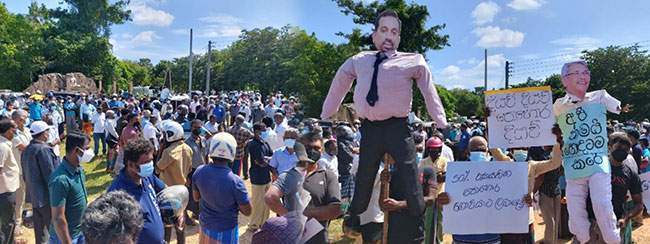
The Response
The island-wide uprising of despairing farmers, beating and burning effigies of senior ministers and demanding a reversal of the fertilizer ban, was met with the promise of organic fertilizer as an alternative. The imported organic nutrient, apparently a mixture of sea weed and faeces- a second virus from China after Corona- was found unsuitable, leading to imports from India of “liquid nitrogen”, a product untried on a large scale in that country. One of the President’s responses to the anguish of the farmers was to declare at a public meeting that he could, if he considered it desirable, use the army to seize the farming community by the scruff of its collective neck and compel them to use organic fertilizer!!
The ban on the slaughter of cattle is a similarly ill-considered directive. Alleviating animal suffering is a noble cause but the consequences of the ban will be dire for several hundred thousand people. The cattle rearing industry is multi-faceted and interconnected. Milk production, beef supply and the supply of animal skin to the tanning industry go hand-in-hand. Dairy industry, which is essentially a small farmer collective enterprise, becomes unviable unless unproductive animals are converted to meat. This ban will disempower around 200,000 individual farmers island-wide, many of them Muslims in the Eastern province. The certain consequences will be the decline of local milk production, scarcity of allied dairy products and the unpreventable escalation of illicit cattle slaughter. That proverb of unknown origin, that ” The Road to Hell is Paved With Good Intentions,” is an apt commentary on both the fertilizer and cattle slaughter ban.
Younger brother Basil, hailed by Rajapaksa acolytes as an economic genius of Einsteinian proportions- despite the absence of previous experience and known academic background – has produced a budget reinforced by bloated statistics and unrealizable dreams. His disgracefully incoherent Budget speech, delivered in Sinhala, justifiably lampooned in multiple forums, was not improved by his rambling, garbled contributions in a subsequent English language interview on the same subject, with Ms Indeewari Amuwatte on Ada Derana. The questions were intelligent, precise and designed to elicit clarity. The responses were vague, evasive and inarticulate, by a man struggling to defend the indefensible in a medium clearly unfamiliar to him; at best a cringe-worthy performance.
Consequences
A frustrated electorate propelled GR in to power in justifiable disgust at the dysfunctional governance of the Sirisena- Wickramesinghe regime, only to be confronted, in less than two years, with an ineptitude of colossal proportions. The enormous parliamentary advantage of a two-thirds majority and a presidency with unlimited power, the two moving in parallel rather than in unison, has paved the way for an economic and social disaster. It is an inevitable consequence of the 20th Amendment, which has expanded the powers of the President, whilst encroaching on the authority of the parliament and the judiciary. When the individual so elected believes that he is the sole repository of wisdom in governance – despite a total lack of experience in the field and a wretched absence of ordinary commonsense – chaos ensues. That is what we see everyday, in mass protests against moronic directives.
The only visible success in governance in Sri Lanka today is the inexorable onward march of the Rajapaksa project, which commenced during Mahinda Rajapaksa’s first term and, after a slight hiccup during the abortive Sirisena regime, has gathered a terrifying new momentum since end 2019. It is conservatively estimated that about 64% of the country’s economy is directly controlled by the Rajapaksa family and those connected to it. In a country rapidly sliding in to an abyss where lies the bleak certainty of food and other essential item scarcities – including pharmaceuticals – widespread malnutrition, loss of employment and livelihoods, declining foreign exchange earnings, disruption to education at all levels and the disintegration of the society, the only glow in a leaden sky comes from the Rajapaksa comet. The State will surely fail but the First Family will surely prosper.
Unless a disoriented and vacillatory opposition quickly gathers its wits, firstly jettisoning the toxic Ranil Wickremesinghe and then rallying round Premadasa – not necessarily the best of men but the only possible alternative – the Rajapaksa dynastic succession, from elder brother to younger brother and from uncle to nephew, and thereafter to another sibling or relative, is a certainty.
Gotabaya Rajapaksa was elected President by the convergence of normally divergent political forces. But, once elected, by-passing the legislature and other democratic institutions, he has chosen to govern through the armed forces and a collection of “Task Forces”, staffed or led by ex-military men, and other disciples and profiteers, answerable to only him. A spineless, collusive and essentially corrupt legislature has become a rubber stamp to his will. A reading of the two year performance report establishes beyond doubt that the “Viyathmaga” is the road to certain ruin, and that the “Eliyamaga” will condemn this country to economic darkness before the Gotabaya presidency ends.
Very recently, parliamentarian Kumara Welgama delivered a speech at the Diyawanna assembly, amusing, but brutally frank, in its exposure of the venality of recent regimes and the familial considerations which overrode national interests in decision making at the highest levels of governance, whilst highlighting the aberrant mentality that pervades the current dispensation. It was also prophetic in the warnings sounded to the ruling regime. Not one of his statements were contested. It must now be clear to all that when madmen are allowed to run the asylum, lunacy becomes institutionalized and insanity infiltrates governance.
Features
A life in colour and song: Rajika Gamage’s new bird guide captures Sri Lanka’s avian soul
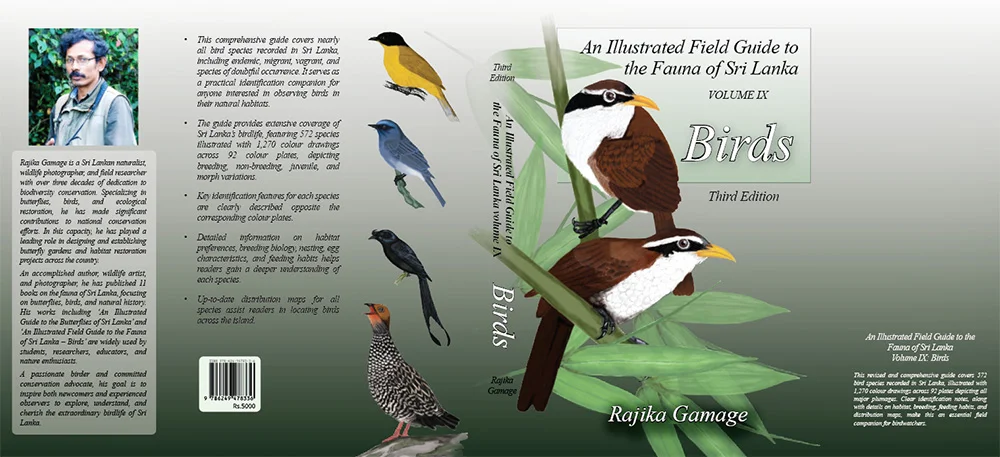
Sri Lanka wakes each morning to wings.
From the liquid whistle of a magpie robin in a garden hedge to the distant circling silhouette of an eagle above a forest canopy, birds define the rhythm of the island’s days.
Their colours ignite the imagination; their calls stir memory; their presence offers reassurance that nature still breathes alongside humanity. For conservation biologist Rajika Gamage, these winged lives are more than fleeting beauty—they are a lifelong calling.
Now, after years of patient observation, artistic collaboration, and scientific dedication, Gamage’s latest book, An Illustrated Field Guide to the Fauna of Sri Lanka – Birds, is set to reach readers when it hits the market on March 6.
The new edition promises to become one of the most comprehensive and visually rich bird guides ever produced for Sri Lanka.
Speaking to The Island, Gamage reflected on the inspiration behind his work and the enduring fascination birds hold for people across the country.
“Birds are an incredibly diverse group,” he said. “Their bright colours, distinct songs and calls, and showy displays contribute to their uniqueness, which is appreciated by all bird-loving individuals.”
Birds, he explained, occupy a special place in the natural world because they are among the most visible forms of wildlife. Unlike elusive mammals or secretive reptiles, birds share human spaces openly.
“Birds are widely distributed in all parts of the globe in large enough populations, making them the most common wildlife around human habitations,” Gamage said. “This offers a unique opportunity for observing and monitoring their diverse plumage and behaviours for conservation and recreational purposes.”
This accessibility has made birdwatching one of the most popular forms of wildlife observation in Sri Lanka, attracting everyone from seasoned scientists to curious schoolchildren.
A remarkable island of avian diversity
Despite its small size, Sri Lanka possesses extraordinary bird diversity.
According to Gamage, the country’s geographic position, varied climate, and diverse habitats—from coastal wetlands and rainforests to montane cloud forests and dry-zone scrublands—have created ideal conditions for birdlife.
“Sri Lanka is home to a rich diversity of birdlife, with a total of 522 bird species recorded in the country,” he said. “These species are spread across 23 orders, 89 families, and 267 genera.”
Of these, 478 species have been fully confirmed. Among them, 209 are breeding residents, meaning they live and reproduce on the island throughout the year.
Even more remarkable is Sri Lanka’s high level of endemism.
“Thirty-five of these breeding resident species are endemic to Sri Lanka,” Gamage noted. “They are confined entirely to the island, making them globally significant.”
These endemic species—from forest-dwelling flycatchers to vividly coloured barbets—represent evolutionary lineages shaped by Sri Lanka’s long geological isolation and ecological uniqueness.
In addition to resident birds, Sri Lanka also serves as a seasonal refuge for migratory species traveling thousands of kilometres.
“There are regular migrants that arrive annually, as well as irregular migrants that visit less predictably,” Gamage explained. “Vagrants, birds that appear outside their typical migratory routes, have also been spotted occasionally.”
Such unexpected visitors often generate excitement among birdwatchers and scientists alike, providing valuable insights into migration patterns and environmental change.
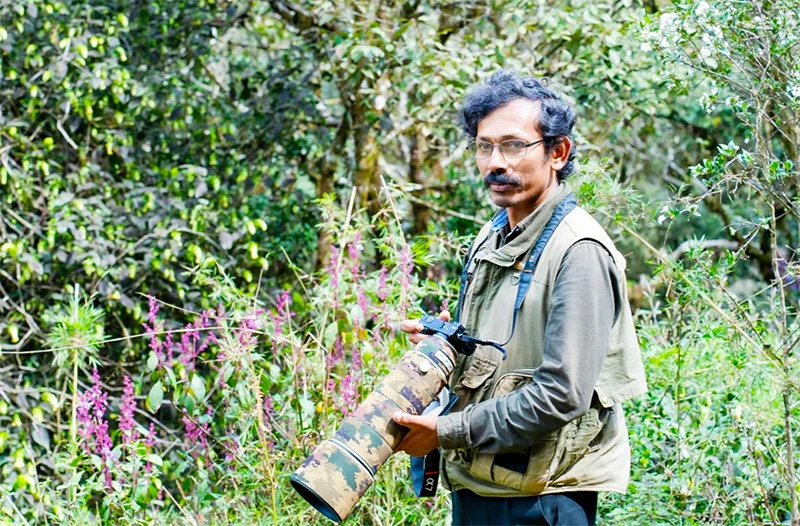
Rajika Gamage
A guide born from passion and necessity
The new field guide represents the culmination of years of research and builds upon Gamage’s earlier publication, which was released in 2017.
“The stimulus for this bird guide was due to the success of my first book,” he said. “This new edition aims to facilitate identification and provide an idea of what to look for in observed habitats or regions.”
The book is designed not merely as a scientific reference but as an accessible companion for anyone interested in birds. Its structure reflects this dual purpose.
“The first section is dedicated to the introduction, geography, and life history of Sri Lankan birds,” Gamage explained. “The second section is the main body of the guide, which illustrates 532 species of birds.”
Each illustration has been carefully crafted in colour to capture the distinctive plumage of each species.
“All illustrations are designed to show each bird’s significant and distinct plumage,” he said. “Where possible, the breeding, non-breeding, and juvenile plumages are provided.”
This attention to detail is especially important because many birds change appearance as they mature.
“Some groups, especially gulls, display many plumages between juveniles and adults,” Gamage noted. “Many take several years to develop full adult plumage and pass through semi-adult stages.”
By illustrating these stages, the guide helps birdwatchers avoid misidentification and deepen their understanding of avian development.
New discoveries and evolving science
One of the most exciting aspects of the new edition is its inclusion of newly recorded species and updated scientific classifications.
“Changes in the bird list of Sri Lanka, especially newly added endemic birds such as the Sri Lankan Shama, Sri Lanka Lesser Flameback, and Greater Flameback, are now included,” Gamage said.
Scientific names and classifications are not static; they evolve as researchers learn more about genetic relationships and species boundaries. The guide reflects these changes, ensuring it remains scientifically current.
The book also incorporates conservation status information based on the latest National Red Data Report and global assessments.
“The conservation status of Sri Lankan birds, as listed in the 2022 National Red Data Report and the global Red Data Report, are included,” Gamage said.
This information is vital for conservation planning and public awareness, highlighting which species face the greatest risk of extinction.
The guide also documents rare and accidental visitors, including species such as the Blue-and-white Flycatcher, Rufous-tailed Rock-thrush, and European Honey-buzzard.
“These represent accidental visitors and newly recorded vagrants,” Gamage said. “Altogether, the first edition offers some 25 additional species, all illustrated.”
Art and science in harmony
Unlike many field guides that rely heavily on photographs, Gamage’s book emphasises detailed illustrations. This choice reflects the unique advantages of scientific art.
Illustrations can emphasise diagnostic features, eliminate distracting backgrounds, and present birds in standardised poses, making identification easier.
“The principal birds on each page are painted to a standard scale,” Gamage explained. “Flight and behavioural sketches are shown at smaller scales.”
The guide also includes descriptions of habitats, distribution, nesting behaviour, and alternative names in English, Sinhala, and Tamil.
“The majority of birds have more than one English, Sinhala, and Tamil name,” he said. “All of these are included.”
This multilingual approach reflects Sri Lanka’s cultural diversity and ensures the guide is accessible to a wider audience.
A tool for conservation and connection
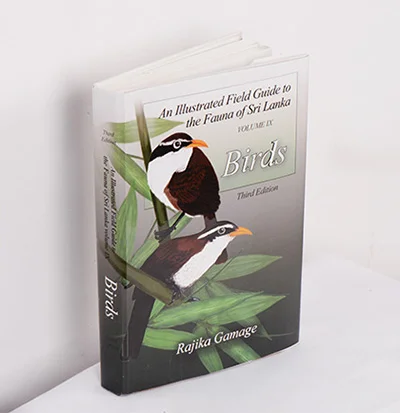
Beyond its scientific value, Gamage believes the book serves a deeper purpose: strengthening the bond between people and nature.
By helping readers identify birds and understand their lives, the guide fosters appreciation and responsibility.
“This field guide aims to facilitate identification and provide a general introduction to birds,” he said.
In an era of rapid environmental change, such knowledge is essential. Habitat loss, climate change, and human activity continue to threaten bird populations worldwide, including in Sri Lanka.
Yet birds also offer hope.
Their presence in gardens, wetlands, and forests reminds people of nature’s resilience—and their own role in protecting it.
Gamage hopes the guide will inspire both seasoned ornithologists and beginners alike.
“All these changes will make An Illustrated Field Guide to the Fauna of Sri Lanka – Birds one of the most comprehensive and accurate guides available within Sri Lanka,” he said.
A lifelong devotion takes flight
For Rajika Gamage, birds are not merely subjects of study—they are companions in a lifelong journey of discovery.
Each call heard at dawn, each silhouette glimpsed against the sky, each feathered visitor from distant lands reinforces the wonder that first drew him to ornithology.
With the release of his new book on March 6, that wonder will now be shared more widely than ever before.
In its pages, readers will find not only identification keys and scientific facts, but also something more enduring—the story of an island, told through wings, colour, and song.
By Ifham Nizam
Features
Letting go: A Buddhist perspective

Buddhism, one of the world’s oldest religions, offers profound insights into the nature of existence and the ways we can alleviate our suffering. As one of the world’s most profound spiritual traditions, it offers a transformative solution: the art of letting go. Unlike simply losing interest in things or giving up, letting go in Buddhism is about liberation, releasing ourselves from the chain of attachment that prevents us from experiencing true peace and happiness. Letting go is a profound philosophical concept in Buddhism, deeply intertwined with an understanding of suffering, attachment, and the nature of reality. This philosophy encourages us to release our grip on desires, attachments, and on what we hold dear- whether relationships, material goods, or even their identities, ultimately leading to greater peace and enlightenment. Our tendency to cling tightly to the various aspects of life leads to a significant source of stress. We tend to grasp at things, perceiving them as solid and permanent, yet much of what we hold onto is transient and subject to change. This mistaken belief in permanence can trap us in cycles of worry, fear, and anxiety.
The challenge of letting go is especially evident during difficult periods in life. We may find ourselves ruminating over lost opportunities, failed relationships, and unmet expectations. Such thoughts can keep us ensnared in emotions like hurt, guilt, and shame, hindering our ability to move forward. By holding onto the past, we often prevent ourselves from embracing the present and future.
At the heart of Buddhist practice lies the concept of letting go, often encapsulated in the term “non-attachment.” Letting go is a crucial concept in both Buddhism and Christianity, emphasising the release of attachments that bind us and contribute to our suffering. At its core, letting go is about finding freedom from desires and acknowledging that both relationships and material possessions are fleeting and transient.
In Buddhism, letting go, or non-attachment, is fundamental for achieving inner peace. The First Noble Truth acknowledges that life is filled with suffering, often rooted in our cravings and attachment to things. The Second Noble Truth teaches that by letting go of this craving, we can transcend the cycles of life and attain enlightenment.
Spiritually, Buddhism emphasises the impermanence of all things (annica). We tend to cling to people, experiences, and even our identities, but everything is fleeting. Recogniing this helps us appreciate the present moment and fosters compassion. Instead of allowing attachments to cloud our relationships, letting go encourages us to engage with others without judgment or expectation, fostering deeper connections.
Philosophically, Buddhism challenges the notion of a permanent self (anatta) that is often the focus of human attachment. It teaches that our identity is not a fixed entity but a collection of experiences and perceptions in constant flux. Understanding this can help us see the futility of clinging to desires and identities, paving the way for a liberated state of being built on wisdom cultivated through meditation and mindfulness.
From a psychological standpoint, letting go can significantly improve our emotional health and well-being. Attachment often breeds fear, anxiety, and stress, while non-attachment promotes resilience and adaptability. When we embrace the idea of impermanence, we become more capable of handling life’s challenges without being overwhelmed. Mindfulness—being present and accepting our emotions without judgment—allows us to process difficult feelings constructively, making it easier to let go of what we cannot control.
Letting go is also an essential concept in Christianity, which emphasises surrender and trust in God. Biblical teachings encourage believers to let go of worries and anxieties, placing their faith in divine providence. For instance, verses like Matthew 6:34 remind individuals not to be anxious about tomorrow, but to focus on the present. By surrendering our burdens to God, we find peace and freedom from the weight of excessive attachment.
Moreover, both traditions highlight the importance of community. In Buddhism, the sangha, or community of practitioners, supports individuals on their journeys toward non-attachment. Similarly, the Christian community encourages believers to lean on one another for support, fostering a sense of belonging and shared faith that helps mitigate the loneliness that comes with attachment.
Ultimately, the concept of letting go serves as a powerful antidote to suffering in both Buddhism and Christianity. By embracing impermanence, cultivating wisdom, and practising mindfulness or faith, individuals can experience profound liberation. In our chaotic world, the principles of letting go offer a clear path toward inner peace, fulfilment, and deeper connections with ourselves, others, and the divine.
Buddhism explores the profound concept of letting go, providing valuable insights into the human experience and pathways to alleviating suffering. Rooted in one of the world’s oldest spiritual traditions, Buddhism presents letting go as a transformative practice, distinct from mere disengagement or giving up. Instead, it encompasses liberation from the chains of attachment that hinder us from experiencing genuine peace and happiness. Christianity too explore this profound concept in its teachings
At the core of Buddhist philosophy lies the idea of non-attachment, which encourages individuals to free themselves from desires and possessions, ultimately leading to tranquility and enlightenment. Letting go is intertwined with an understanding of suffering, attachment, and the transient nature of existence. This philosophy instructs us to relinquish our grip on what we hold dear—whether relationships, material goods, or even our identities—recognising that these are impermanent.
Buddhism’s First Noble Truth acknowledges that life inherently involves suffering, often stemming from our cravings and attachments. The Second Noble Truth reveals that overcoming this craving is key to transcending the cycles of life and achieving enlightenment. Emphasising the impermanence of all things, Buddhism invites us to appreciate the present moment and fosters compassion by helping us detach from fixed identities and experiences. This awareness enriches our relationships, allowing us to connect with others free from judgment or expectation.
Philosophically, Buddhism challenges the notion of a static self (anatta), asserting that our identity is not a fixed concept but rather a fluid collection of experiences. Recognising this notion helps highlight the futility of clinging to desires and identities, opening the door to a liberated existence founded on wisdom cultivated through meditation and mindfulness practices.
From a psychological perspective, the act of letting go can significantly enhance emotional health and well-being. Attachment often fuels fear, anxiety, and stress, while embracing non-attachment cultivates resilience and adaptability. By accepting impermanence, we equip ourselves to face life’s challenges with greater ease. Practicing mindfulness—being present and accepting emotions without judgment—further facilitates the process of releasing what is beyond our control.
In Christianity, the theme of letting go is also prominent, emphasizing surrender and trust in God. Scripture encourages believers to release their worries and anxieties by placing their faith in divine providence. For example, Matthew 6:34 advises individuals to focus on the present rather than fret over the future. By surrendering our burdens to God, we can experience relief from the weight of excessive attachment.
Both traditions underscore the significance of community in supporting the journey of letting go. In Buddhism, the sangha, or community of practitioners, encourages the pursuit of non-attachment. Likewise, Christian fellowship fosters belonging and shared faith, helping believers lean on one another for strength and mitigating the loneliness that can arise from attachment.
Ultimately, the concept of letting go serves as a powerful antidote to suffering in both Buddhism and Christianity. Embracing impermanence, nurturing wisdom, and practising mindfulness or trust can lead individuals toward profound liberation. In an increasingly chaotic world, the principles of letting go illuminate a pathway to inner peace, fulfilment, and deeper connections with ourselves, others, and the divine. By understanding and embodying this philosophy, we can navigate life’s complexities with grace and openness.////Buddhism delves into the profound concept of letting go, offering valuable insights into the human experience and pathways to alleviating suffering. As one of the world’s oldest spiritual traditions, Buddhism presents letting go as a transformative practice that goes beyond mere disengagement or resignation. It represents liberation from the chains of attachment that prevent us from experiencing true peace and happiness. Similarly, Christianity explores this profound concept in its teachings.
At the heart of Buddhist philosophy is the idea of non-attachment, which encourages individuals to free themselves from desires and possessions, ultimately leading to tranquility and enlightenment. Letting go is closely related to an understanding of suffering, attachment, and the impermanent nature of existence. This philosophy guides us to loosen our hold on what we cherish—be it relationships, material possessions, or even our own identities—recognizing that everything is transient. Through this understanding, we can cultivate a deeper sense of peace and fulfillment in our lives.
 BY Dr. Justice Chandradasa Nanayakkara
BY Dr. Justice Chandradasa Nanayakkara
Features
Brilliant Navy officer no more
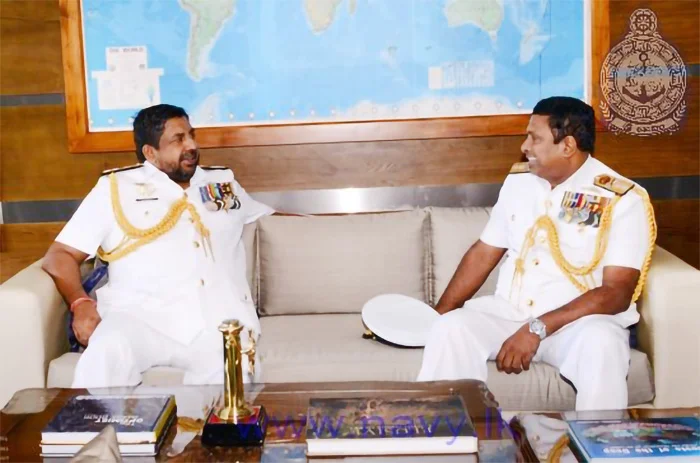
Rear Admiral Udaya Bandara, VSV, USP (retired)
This incident happened in 2006 when I was the Director Naval Operations, Special Forces and Maritime Surveillance under then Commander of the Navy Vice Admiral Wasantha Karannagoda. Udaya (fondly known as Bandi) was a trusted Naval Assistant (NA) to the Commander.
We were going through a very hard time fighting the LTTE Sea Tigers’ explosive-laden suicide boats that our Fast Attack Craft (s) and elite SBS’ Arrow Boats encountered in our littoral sea battles.
Brilliant Marine Engineer Commander (then) Chaminda Dissanayake, who was known for his “out of the box” thinking and superior technical skills on research and development, met me at my office at Naval Headquarters and showed me a blueprint of an explosive- laden remotely controlled small boat.
Udaya’s Naval Assistant’s office was next to mine, the Director Naval Operations office. Both places are very close to the Navy Commander’s office. I walked into Bandi’s office with Commander Dissa and showed this blueprint a brilliant idea. Being a Marine Engineer “par excellence”, Bandi immediately understood the great design. I urged him to brief the Commander of the Navy with Commander Dissa.
My burden was over! Bandi took over the project and within a few weeks we tested our first prototype “Explosive-laden Remotely Controlled arrow boat “at sea off Coral Cove in the Naval Base Trincomalee. It was a complete success.
This remotely controlled boats went out to sea with our SBS arrow boats fleet and had devastating effects against LTTE suicide boats and their small boats fleet. Thanks, Bandi, for your contribution. The present-day Admiral of the Fleet used to tell us during those days “you cannot buy a Navy – you have to build one”!
We built our own small boats squadrons at our boat yards in Welisara and Trincomalee to bring LTTE Sea Tigers. The Special Boats Squadron (SBS) and rapid action boats squadron (RABS) being so useful with remotely controlled explosive-laden arrow boats to win sea battles convincingly.
Bandi used to say, “Navy is a technical service and we should give ALL SRI LANKA NAVY OFFICERS FIRST A TECHNICAL DEGREE AT OUR ACADEMY (BTec degree).” That idea did not receive much attention here, but the Indian Navy—Bandi graduated as a Marine Engineer- at Indian Navy Engineering College SLNS Shivaji in Lonavala, Pune, India— understood this idea well over two decades ago. Indian Navy Commissioned their new Naval Academy at Ezhimala (in Kerala State) which is the largest Naval Academy in Asia (Campus covers area of 2,452 acres) starts its Naval officers training with a BTech degree, regardless of what branch of the navy one joined.
Bandi’s technical expertise was not limited to SLN. He was the pioneer of “Mini – Hydro Power projects” in Sri Lanka. When I was a young officer, he urged me to invest some money in one of these projects and advised me “Sir! as long as water flows through turbines, you will get money from the CEB, which is always short of electricity”. I regret that I did not heed Bandi’s advice.
When he worked under me when I was Commander Southern Naval Area, as my senior Technical Officer, I observed pencil marks on walls of his chalet and I inquired from him what they were. He said it was the result of his “pencil shooting training”, a drill Practical Pistol Firers do to improve their skills. He used to practice “draw and fire” drills and pencil shooting drills late into nights to be a good Practical Pistol firer in Sri Lanka Navy team. He didn’t stop at that. He represented Sri Lanka National Practical Pistol Firing team and won International Championships.
As the Officer in charge of Technical Training in the Navy, he worked as Training Commander to train Royal Oman Navy Engineering Artificers in Sri Lanka, especially on Fast Attack Craft Main Engine Overhauls. The Royal Oman Navy Commander was so impressed with the knowledge acquired by Artificers that he donated money for the construction of a four-storey accommodation building for Sri Lanka Navy Naval and Maritime Academy, Trincomalee now known as “Oman Building”. The credit for this project should go to Bandi.
Bandi’s wife was a senior Judge of Kegalle High Court, and she retired a few years ago. Their only child, a son studied at the British School, Colombo and followed in his mother’s footsteps became a lawyer. Bandi was so much attached to his family and very proud of his son’s accomplishments.
When Bandi was due to retire in 2016 as a Rear Admiral and Director General Training, after distinguished service of 34 years, and reaching retirement age of 55 years, I requested him to serve for some more years after mobilising him into our Naval Reserve Force. He had other plans. He wanted to take his mini-Hydro Power projects to East African countries.
His demise after a very brief illness at age of 64 years was a shock to his family and friends. His funeral was held on Feb. 27 with Full Military Honors befitting a Rear Admiral at his home town Aranayake.
Dear Bandi, the beautiful Sri Lanka Navy, Naval and Maritime Academy in Trincomalee, which was built with your efforts will serve for Sri Lanka Navy Officer Trainees and sailors for a very long time and remember you forever.
May dear Bandi attain the supreme bliss of Nirvana!

Naval and Maritime Academy, Trincomalee
By Admiral Ravindra C Wijegunaratne
WV, RWP and Bar, RSP, VSV, USP, NI (M) (Pakistan), ndc, psn, Bsc
(Hons) (War Studies) (Karachi) MPhil (Madras)
Former Navy Commander and Former Chief of Defence Staff
Former Chairman, Trincomalee Petroleum Terminals Ltd,
Former Managing Director Ceylon Petroleum Corporation,
Former High Commissioner to Pakistan
-

 Opinion4 days ago
Opinion4 days agoJamming and re-setting the world: What is the role of Donald Trump?
-

 Features4 days ago
Features4 days agoAn innocent bystander or a passive onlooker?
-

 Features6 days ago
Features6 days agoBuilding on Sand: The Indian market trap
-

 Opinion6 days ago
Opinion6 days agoFuture must be won
-

 Features5 days ago
Features5 days agoRatmalana Airport: The Truth, The Whole Truth, And Nothing But The Truth
-

 Business6 days ago
Business6 days agoDialog partners with Xiaomi to introduce Redmi Note 15 5G Series in Sri Lanka
-

 Business5 days ago
Business5 days agoIRCSL transforms Sri Lanka’s insurance industry with first-ever Centralized Insurance Data Repository
-

 Sports7 days ago
Sports7 days agoCEA halts development at Mandativu grounds until EIA completion













